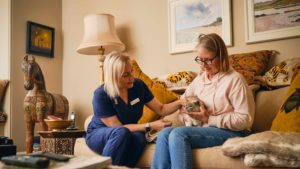What to expect at a vet home visit
When one of our team visits for the first time, they will prioritise getting to know you and your pets. So, what can you expect?
- There will be lots of time to talk as there will likely be many questions on both sides.
- We will give your pet time to check us out too. There is no need to worry about how your pet will behave. We will have seen it all before and will guide you on how to get the best from the visit.
- The vet will take a history. They will listen to what has happened to your pet in the past, your current concerns and perform a visual and physical examination.
- The vet will discuss their findings with you, discussing treatment options and whether further investigations, tests or trial therapy are appropriate. Some of these can be carried out at the time, and some will need to be planned for a future visit or require treatment at the surgery in Hempnall.
- All decisions are made jointly between you and the vet.
Seeing pets in their own environment has additional benefits in that the vet or nurse can better assess the pets’ behaviour when it is relaxed, how it interacts with other members of the household and determine how the home environment may be adapted to better suit their needs. For more information, check out our 5 Top tips to make a vet home visit as successful as possible.
Vet home visits – what is possible, what is not possible
The majority of assessments, treatments and routine healthcare requirements can be delivered to your pet within the home. These often include most blood testing and some ultrasound assessments.
Because we are examining pets in a home environment, often with only one vet team member, we rely on the pet’s compliance and goodwill to achieve our aims. Unfortunately, while most pets can be gently persuaded or bribed to be restrained and examined, many also object to such interventions.
We prefer to discuss with all owners the benefits versus the costs to your pet of any such intervention and make a plan that suits everyone.
- We will not force treatment on or manhandle animals that are already distressed. This sometimes means it will be in the animal’s best interest to conduct further investigations or treatment under sedation.
- We prefer to carry out procedures requiring sedation in the hospital where we have a full surgical suite, including emergency oxygen and resuscitation drugs easily to hand in the rare event they should be needed.
- It is possible to sedate younger, healthy animals at your home – e.g., to suture a wound or take blood from a fractious pet. However, the risks and benefits of such procedures need to be weighed before agreeing on a course of action.
- All surgery, dental, and in-patient treatments are carried out at the clinic in Hempnall.
Nervous and anxious pets
We are asked to visit a lot of pets that find going to a regular veterinary practice quite stressful. Sometimes they have had a bad experience being restrained or have had to undergo extensive treatment. In addition, rescued animals may be anxious due to their previous adverse experiences, and some cats simply do not care to be handled.
While we are more than happy to help find a way forward with all such pets, the amount of physical handling the pet will permit often dictates what we can achieve. We know many pets are anxious or ‘aggressive’ out of fear. Pets that are fearful, if examined or restrained against their will, will be distressed, and have no option but to bite or lash out with a potential risk of injury to all concerned.
This is something that we all wish to avoid. In these situations, we will talk you through the additional procedures – such as sedation, muzzle training or behaviour training, that will assist with achieving a happy outcome for all.
Feral cats
Norfolk seems to have a very healthy feral cat population and, happily, a large number of generous people who look out for and feed them.
If you are concerned about a feral cat, we are always happy to advise you about the best approach. However, to be able to prescribe and treat these cats, we will need to make at least a visual inspection of their condition and possibly need to sedate the cat to carry out treatment. This usually involves trapping the cat. Unfortunately, we cannot provide any treatments without at least a close-up and meaningful visual examination.
“Knowlegeable and calm”
Rosie from Paws Indoors is a very caring lady, is extremely knowledgeable and calm whatever the situation. My little cat Barney enjoyed another year of life thanks to her. She treats my other cats and has even given my chicken a new lease of life. The fact that she comes to your house takes all the stress out of vet visits, with no travelling or waiting in a busy waiting room with your very stressed pet. I would highly recommend her to anyone.

